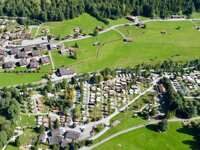
Winter driving
The do's, don't's and other top tips of driving on the continent in winter
It's worth reading up on the destination you wish to visit before you arrive, especially if you're travelling during the winter months as the rules of the road are often different during this period. The prospect of confronting snowy, icy and wet roads can be daunting but camping and caravanning in low season certainly has its benefits.
Before you leave...
- Get your car and caravan, or motorhome serviced to make sure everything is in good condition
- Add antifreeze to the windscreen fluid
- Allow extra time for your journey and plan alternative routes just in case
- Check your tyre tread depth and pressure
- Stock up for the journey - things like food, water, blankets, first aid kit, hand warmers etc
- If you're planning on crossing the Alps or Pyrenees, check out our guide to the Mountain Passes of Europe.
What to pack for the journey
Ice scraper and de-icer basic but must-haves for winter drives.
Torch and spare batteries don't rely on your phone, a powerful torch can be a lifesaver if you breakdown at night.
Warm clothes and blankets a breakdown could mean a long wait with no heat so make sure to pack a coats, spare jumpers, hats and gloves for all passengers. Hand warmers are also a good idea.
Hi-vis jackets these are required by law in many European countries and are one of the most important pieces of kit to carry in your vehicle
Boots with good grip remember to wear suitable shoes for driving in but also pack some good boots that are able to cope with treacherous weather conditions.
First aid kit it is highly recommended that you have a first aid kit in the car just in case any minor injuries occur. The British Standards Institute set a national standard for first aid provision within motor vehicles.

Jump start cables flat or dead batteries can happen to any car regardless of age. Cold weather can increase the likelihood of this sort of thing happening so it pays to be prepared.
Empty fuel can for urgent vehicle emergencies!
Food and drink a flask of tea, coffee or soup, long-lasting snacks, high-energy food, bottled water and pain killers are all must-haves. If you're camping, you may also be carrying a portable stove which could come in handy.
Shovel its easy for a vehicle to get stuck in deep snow so a shovel could become a lifesaver.
Reflective warning triangles this is a legal requirement in many European countries.
A road atlas don't rely on your phone or sat nav!
Sunglasses low winter sun can affect visibility, creating a glare which can make it difficult to see the road ahead so make sure you have a pair of sunglasses to hand.
In-car phone charger and a portable battery charger your phone battery won't last forever!
Locking wheel nut key these keys are designed to make sure that your wheel and alloys can't be stolen. They are also used to change your wheel or tyre.
16% of European drivers would never drive in icy conditions
Goodyear’s Winter Driving Attitudes Survey 2022
Tyres, chains and tread
Why winter tyres? Winter tyres improve handling and assist in decreasing stopping distances on wet, snowy and icy, or otherwise slippery roads. They can be fitted on all tyres, or just the front driving wheels.
Why snow chains? Snow chains are fitted on 'normal' tyres and they increase the traction between the vehicle and the road surface. The chains are coated in a special rubber compound that is effective at lower temperatures.

Only 45% of British drivers know the difference between season-specific and all-season tires
Goodyear’s Winter Driving Attitudes Survey 2022
Our top tips
Check your walking boots make sure they are in tip top condition
Check the forecast if you're British, you won't need telling!
Take less stuff do you really need outdoor furniture in the middle of winter?
Take more stuff don't forget extra blankets and other cosy clothes
Tape up put reflective tape on anything you've previously walked into in the dark - avoid those nasty shin injuries!
Take a good book or board game there will be dull days where you just don't fancy going out

Other things to consider
Heating
Modern leisure vehicles tend to be well-insulated, are fitted with efficient heaters, and couple that with a high tog duvet or sleeping bag, you should stay toasty through the night. You may want to fit insulated covers on the cab windows of a motorhome to reduce heat loss.
Campervans can be more problematic as they don't have as much insulation and often use single-glazed windows, so just remember to stock up on extra clothing, blankets and invest in a good duvet!
If you decide to install a heating system, be warned that systems vary in price and efficiency. Most use quite a lot of gas and battery power but generally, if you just need a little extra warmth in the morning, a small, thermostatically-controlled fan heater will do the job if connected to mains hook-up.
Fresh water
Many motorhomes and some caravans have on-board water tanks which are less likely to freeze but if you have an external tank, its worth getting an insulating cover or keeping a small container inside.
Waste water
To stop the chance of your waste water tank freezing, we recommend taking one or more of the following preventative measures:
- Use an insulating cover
- Install a low-powered electric heater
- Add salt to the container
- Add a glycol-free caravan/motorhome anti-freeze
Never use glycol-based car anti-freeze as it cannot be disposed of safely due to environmental reasons.
It is recommended to leave the tank’s water release valve permanently open so water passes through and collects in a bucket or purpose-made container. Empty it as often as needed.
Gas
Propane is a good year-round gas but especially so in the colder, winter months. Liquefied butane is more efficient and therefore cheaper but it should not be used in cold temperatures as it can't turn to gas at temperatures lower than 0*C.
Refrigerator covers
To prevent a fridge over-cooling, covers are made for the external air vents. On a Dometic or Electrolux fridge, these should be fitted when outside temperatures fall below 10C (50F). On a Thetford fridge, covers are required when temperatures fall below 8C (46F).






